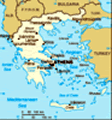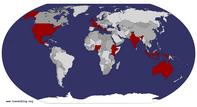Advertisement
Published: September 5th 2006
Through Fervent Seas Peering through the dark, ravished from a night on a bench with the soft vibrations of the ship’s engines, I saw Crete. My eyes shuttered. They wanted rest, to evaporate from the world surrounding and return to the forgotten lands where dreams relate to one another on a gossamer thread. But my mind; it singed my lashes and brows with the ferocity of ancient fable. Crete. I heard so much. I had a conscious tale of the Cretan in my mind. Who was he? Where did he come from?
Half passed five o’clock in the morning, the land was dark except for sparsely dotted housings emitting a constellation of pulsing lights. I saw the tracers of headlights, darting through the thin brush like fireflies. I smelled the sea air of maritime travel, now mixed with the sweet earthen scent of eucalyptus and the offshore breezes lure the water-bound. Classic Crete. My mind fast-forwarded on a reel of all knowledge I ever ingested. Now it was time to digest.
From the earliest mythological references of a birthing Western World to the sound revolutions of caiques and ships masquerading the Mediterranean in search of the origin of the
Greek, the Romans, Venetians, the Turks—an Ottoman, Byzantine or Roman Empire—and further distending deep into the Biblical times of St. Paul and his knowledge of Greek being the language of civilization; what was the Cretan? What kind of people lived here?
My mind kept the eyes wide. Through the thinning dark of late night into early dawn, I pictured the Cretan: he was large, taut like a mast against fierce gales, with gritty muscles winding through the skeletal structure. Skin was a penetrating brown, casting off the rays of the sun with a glisten of sweat, shouting to the Heavens, “Burn me with all your might! And ever more wish to see me run to shade!” Black eyes were stealthily held within deep-set cranial pockets sheltered by the bush of thick wiry brows. Coarse hair and an unshaven beard hid the sharp facial features of a beast angling for the kill.
My Cretan; tall, powerful, stern and selfishly independent within the face of the spawns of Zeus himself. Everyone was out for them. Who controlled their land controlled the gateways of the Mediterranean farther east and west. These were the children of the God of Gods, and their kin kept
the pack of saintliness throughout the forces of bombings during WWII and Nazi Germany to the present day.
Only 60-plus years previous, Nazis tormented and flattened the various townships along the Cretan shores and within its interior. What was sixty years in the face of eternity anyway?
I searched perilously over the rail for a Cretan, yet some two hundred meters off shore within an early Saturday morning, all odd were against me. Albeit, we eventually docked.
For some reason, among all my travels throughout Southeast Asia, Nepal, India, and West Africa—the depths of ancient culture—my heart was calm and never thumped with the fervor and reverence as it did when I disembarked the F/B Lato from Piraeus. I officially stepped upon that same Cretan soil which had been sought after so religiously and it was as though I emerged from a taverna after finding the key to the door to only discover forty years had passed with me drunk, face down in the bottom of the basement.
This was my Crete.
Absorbed in the Solitude of an Island I spent my first night on Crete upon her thirsty summer soils. Camping Chania housed

 Ceramic Janissaries
Ceramic Janissaries
The Mosques of the Janissariesa nice olive grove complete with shade and twiddling doves. Crete was now on me, within me, and that first night it hit me like a cudgel to a dead-beat witch.
It struck firmly like Sunday church bells. It was 5:30 in the earliest of evenings. I hit the ground floor within my tent and was out intermittently until forcefully rising at 8:30 PM. Each time I woke I had a sense of complete phantasmagoria; a sense of dreamful imagination swept over the decades of rivalry and maritime sieges, without a sudden clue as to which olive grove I slept beneath. Startled by a twilight Van Gogh within a twist of wiry branches, seconds slowly winded down until the illusion began to shake clearly and a recognition of space and time awoke. I was in the grounds of Camping Chania, paying ten euros for my site each night; six per person, four per tent.
The day of my arrival, what seemed like a day within the whole cyclic turn of the seasons, was long. Beginning before dawn at 6 AM on the F/B Lato, I met a man not from Crete, but from Syria, who spoke and understood
little English. Nonetheless, he fanned my blazing image of the Cretan with gusto. “People of Athina good. People of Kriti very good.”
I nodded and smiled, but he chose to repeat this statement three more times with a strange emphasis throughout our conversation.
Disembarking, my Crete went wild. Sleepy eyed, but firing with excitement at the arrival at a new destination, I saw my Crete. Like any other person, Cretan locals were sleepy. They were yawning! This was the Crete of war, defense, of fiery righteousness in the face of the Gods themselves! For Heaven sakes, Zeus himself was born upon their land, or better yet, they’re born and raised upon His!
The day was young. Upon a bus, we drove the six kilometers west into Chania from Port Souda and there I caught the towns pompous Venetian waterfront at the height of its flare: empty.
Chania (pronounced Hanya, spelled Xania, and often Hania) was the capital of Crete prior 1971 and boasts a stylistic display of cafes, tavernas, hotels and shops. Jewelry, clothing, artwork, shoe stores and classy boutiques lined the narrow alleys that stubbornly packed the fronts. Surely with all this metropolis-consumed merchandise, it
would be oft known as the “Milan of Venice” instead of its Venetian similarities. But to me on my early arrival within the heart of my Cretan imagery, the town was empty, dead, beautifully asleep to the course of the rising sun, which was yet to peak over the shores eastward.
Cafes and tavernas were silent except for their servants who folded the sheets and fluffed the pillows for a few and scant risers. Numinous patterns of tables and chairs were arranged like the start of a champion’s chess game, and few old locals arduously tossed a hand line in the morning’s stirring sea. The quaint harbor was still with all shops barred and gated.
With the rise of the sun, a warm soft light clothed the rooftops and bathed the various decrepit shingled windows in a panoply of Venetian hue. The two and three storey buildings were rustic with short narrow climbs toward the littered clouds of the sky. Concrete chipped in rough stucco blocks. Windows framed with raw planks of wood. They sagged with the weight of storm-soddened shingles. Some opened onto a minuscule patio fit for a single dwarf and his solitary tea party. At

 Shadows of the Century
Shadows of the Century
A Cathedral of the Venetians and their ruling 16th centurythese, simple Venetian and old Victorian tea tables of black and maroon wire sat empty as their inhabitants slept behind closed shutters.
From opposite ends I wandered, snapping photographs of the calming scenes before me. The day of the morn was still, but inspiringly alive with the frescos of Grecian imagery. I walked westward, unsure of my destination and how long those four kilometers to the nearest campsite would take. My Cretan filled my thoughts.
The Camps of Civilization Two days and two nights passed with time catching up to my body and knocking me astray. I wandered the beaches, slept upon them and felt the history, which eroded away with her shores. Crete, my Crete, was alive in my head and recorded in magnanimous detail on shelves and shelves of libraries. But one thing is certain; the people retain a determined heart and soul. The island thumps with the celebration of family, friends, Turkish coffee, cappuccinos and cigarettes far-fetched within a pride of independence.
From the steps across the Golden Beach and onward through the sands broken up by the jutting cliffs of stubborn rock, I reach the old harbor of Chania (remember? Hanya) and
sit on edge upon the northeastern most outer wall. A breeze persistently combs my hair head on. It’s gentle, warm, yet cooling under the late summer’s defiant heat. Beyond the hundred meters of flat reef, a snorkeler dives down the sea wall, two fins erect straight-long like a descending whale. Small rolling waves lurch over his dive, subtly pushing him towards the wall as they tumble and crest upon the rocks above.
Beneath me, along a thinned spit of rocky shore until the Mediterranean converges upon this ancient wall of defense, a lone fisherman spins his arm like a bucolic windmill thrusted in rapid gyration by a torrent of gusts until suddenly, with the built inertia, he hurls a thin translucent line toward the waves. Against the breeze, the line hisses with the sea serpent’s tongue and falls far short, slapping the water with a chunk of white flesh. It sinks down into one of the reef’s turquoise pockets, feeding the swarms of baitfish within the current.
A Sunday; mellow as locals keep shops closed and follow the island pursuits that matter most. These are the people, island folk like most marooned civilizations who were once caught within the
fray of empirical tapestry woven with the intent of suffocation. Cretans are a people strong of heart, determinedly dependent on Grecian nationalism after the ages of history.
From the civilizations of Italy, Turkey, Eastern Europe, North Africa, France, Middle East and the farther Asia Minor, and with a spread of ancient paganism to classic mythology within a land of Orthodox Christians and devout Muslims—from the sights, scents and perspectives of this culture, they know it well within the southeastern Aegean Sea further south into the Sea of Crete. From all sides, within each direction of time, the Cretan retains its surge through life, ordained with the ferocity of that of the dawn’s wilted fisherman to the bustling jazz of a café’s hostess. My Crete survives with me.
Advertisement
Tot: 0.074s; Tpl: 0.015s; cc: 8; qc: 24; dbt: 0.025s; 1; m:domysql w:travelblog (10.17.0.13); sld: 1;
; mem: 1.1mb

















Rosemary
non-member comment
wowie zowie
Dear dear Cambo.....your prose takes me with you.....and then...on top of that...your pictures !!!!! Oh thank you....such color and feeling and excitement. I am with you.....thank you for taking me along. I love you.....always....xxRosemary